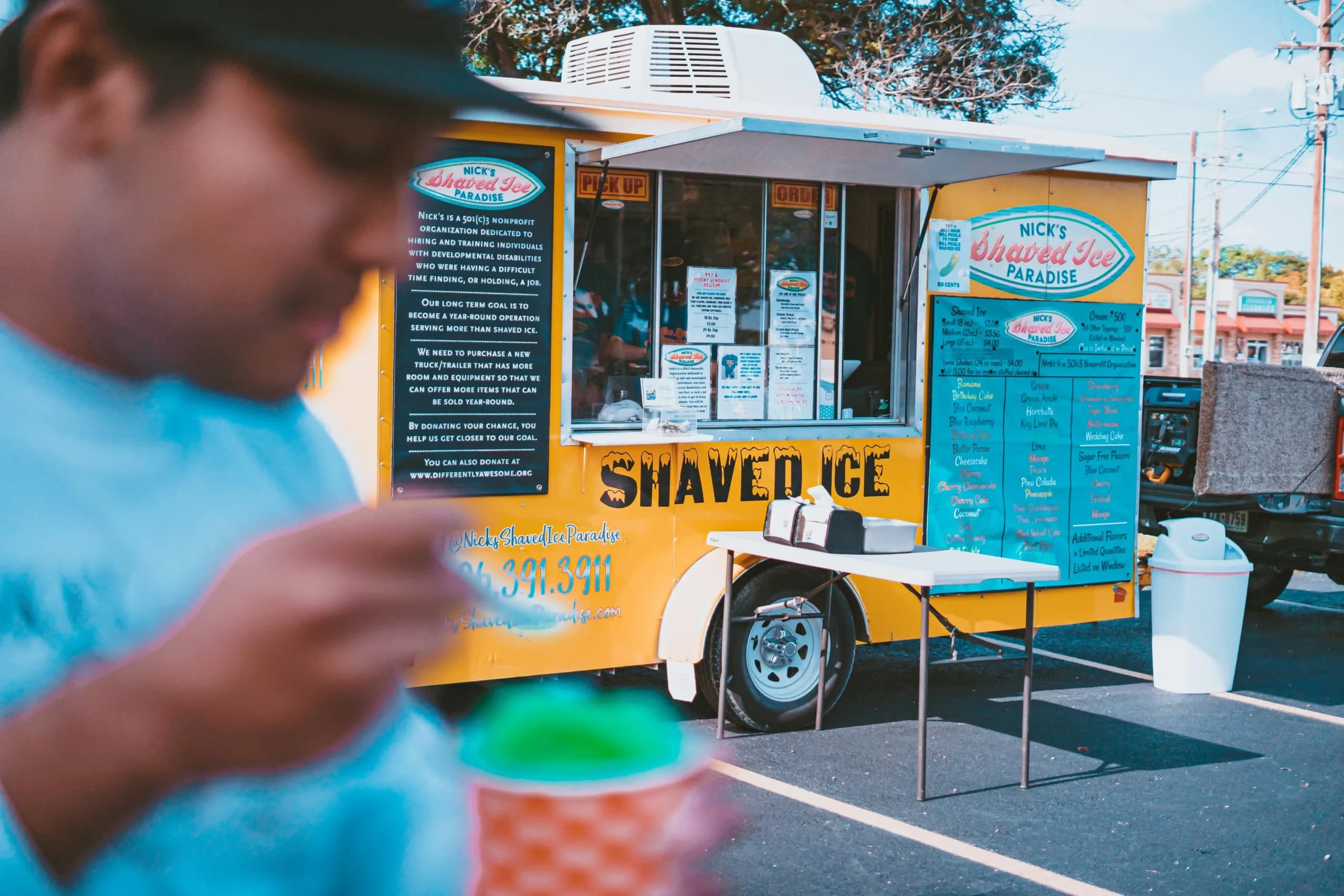Summary
Location: South Carolina, USA
South Carolina food trucks need multiple licenses across state and city levels to stay open, safe, and compliant. You’ll need approvals for food safety, taxes, fire code compliance, staff training, and permission to operate in each city or county you plan to serve.
Key South Carolina food truck regulations:
- Annual retail food establishment permit renewal costs based on projected gross sales
- Trucks must return every 24-72 hours to commissaries
- Operating in Charleston requires multiple permits
- Greenville enforces 250-foot rule from restaurants
- Truck and kitchen equipment must be registered for business personal property tax if over $50,000
From Charleston to Columbia, South Carolina is packed with opportunities for mobile food vendors. Before you can serve its customers, though, you’ll need to comply with essential food truck licenses in the state. From state to city, county-specific requirements, it’s best to spend time understanding what you need to submit so you can join the nearly 3,000-strong food trucks in the state.
1. Retail food establishment permit
The first step to opening a food truck in South Carolina is getting your retail food establishment permit. It’s issued by the South Carolina Department of Health and Environmental Control (DHEC) and is required for any food business that prepares or serves food to the public.
To start the process, you’ll need to fill out Form DHEC 1769, which acts as your formal business license application for operating a mobile food unit. You must submit this form at least 30 days before you plan to open. Without this permit, you won’t be able to legally operate your truck or apply for other permits, like a local business license or a health permit.
One of the key requirements for this permit is having a commissary agreement in place. This means your truck must be tied to a licensed commercial kitchen, called a commissary, that you’ll return to regularly. It’s where you’ll handle tasks like food prep, dishwashing, waste disposal, and water refills. SC law requires food trucks to return to their commissary every 24 to 72 hours, depending on the type of operation.
Once your form is submitted, DHEC will schedule an inspection. You’ll need to pass inspections for both your truck and your commissary before you can get approved. This truck inspection covers everything from safe food storage and sanitation to water systems and overall cleanliness.
All applicants must pay a non-refundable initial, one-time permit fee of $100. For the annual inspection fee, you’ll have to check your projected gross sales. It ranges between $100 to over $250 for those earning above $1,000,000 yearly.
2. Mobile food facility permit
A mobile food facility permit is also a must-have if you cook, prep, and store food on your truck. It covers key areas like food safety, fire safety, sanitation, and waste disposal.
Depending on how your food truck operates, local requirements may vary. For example, some cities and counties, like Charleston and Mount Pleasant, might ask for extra fire inspections or even an additional truck inspection from the health department.
You’ll likely need to submit documentation for things like your hood ventilation system, clean water supply, gray water tank, and how you plan to dispose of grease and trash.
The cost for a mobile food facility permit is usually around $200 per year, but that can change based on your county and your specific food setup. Be prepared to show that your truck has met all local safety and health rules before you get the green light to operate.
3. City and county business licenses
Once you’ve got your state licenses and food truck permits, you still need a business license for every city or county where you plan to operate. These typically include zoning limits, parking restrictions, and operating hour rules. Some cities even require special decals or temporary use permits before you can set up.
Greenville
To run a food truck in Greenville, you must apply for a City of Greenville business license. You also need to fill out the mobile food vendor application and get approval from the city’s zoning office.
Greenville limits where and when you can operate. You’ll need permission from private property owners, and your truck must be parked at least 250 feet away from any open restaurant, unless you have written approval from that restaurant’s owner.
You also need to return to your commissary at least every 72 hours to clean, restock, and dispose of waste. Keep records to show you’re following the rule.
Charleston
Charleston has stricter rules for food trucks, especially in the historic district. First, apply for a City of Charleston business license. Then, complete the mobile food vending permit through the Revenue Collections Office.
If you plan to operate on public property (like a park or street), you’ll also need a temporary use permit and possibly an operational permit from the Fire Department.
Columbia
To operate in Columbia, you’ll need a city business license plus a mobile vendor permit. This includes a review of your food truck floor plan and operations.
Columbia enforces a 100-foot buffer zone from existing restaurants. You’re also restricted from vending in residential zones during late-night and early-morning hours, typically from 9 p.m. to 9 a.m.
As in other cities, your commissary kitchen must be inspected and documented. Columbia also checks your trash disposal, water refill process, and food waste handling.
4. Retail license (sales tax permit)
Before you can legally sell anything in South Carolina, you need a retail license, also known as a sales tax permit. This license is issued by the South Carolina Department of Revenue (SCDOR) and is required for all businesses that sell food, drinks, or other taxable items.
With this license, you’re allowed to collect and send in sales tax to the state. Most food trucks will also need to collect a hospitality tax, which is an extra 1% to 2% in some counties. This applies to prepared food, so if you’re serving hot meals or beverages, you’re likely on the hook for both taxes.
To get this license, apply online through the SCDOR website. You’ll need to enter details about your business, including your planned opening date, your food offerings, and where your truck will operate.
Even if you already have a business license or a health permit, you still need this separate retail license to stay compliant with SC tax law. You won’t need to pass a truck inspection for this step, but you should keep the paperwork with you in case you’re ever audited.
5. Business personal property tax registration
If your vehicle and food truck equipment are worth more than $50,000, you’ll need to register for business personal property tax with the SCDOR. This applies to things like your truck, grills, fryers, coolers, generators, and even your POS system.
The purpose of this registration is to make sure your business is paying the right amount of tax on the property it owns. It’s not a one-time deal either. This is an annual requirement in SC, and you’ll need to file it every year.
The state uses this report to figure out how much your property is worth, then calculates how much tax you owe. The form is pretty simple to fill out, especially if you keep good records. You’ll report the original cost of each item and when you bought it.
6. Food handler’s license (employee health permit)
Both owners and staff who work with food must have a valid food handler’s license or employee health permit. It’s how the state makes sure your food is safe for customers.
Each new hire has 30 days to get certified after they start working. If they’re not certified by then, they can’t legally handle food.
The most common certification options are ServSafe and the SC food handler card. Both are approved in the state and widely accepted. The training can usually be done online, and it costs about $15 per person.
If you have a manager who already holds a food protection manager certification, they may not need to take the basic food handler course. Even if they’re exempt, it’s still smart to make sure they understand SC’s specific health permit guidelines for food trucks.
Mark your calendars for renewals
Getting your food truck license in South Carolina is only half the battle. You must keep track of expiry dates, so you can renew them as soon as possible. Most documents, like health permits and business licenses, need annual renewal. Use a checklist and set reminders in your calendar to monitor each license type.
| Permit or requirement | Who issues it | Renewal timeline | Notes |
| Retail food establishment permit | SC DHECl | Annually | Required for all food trucks serving food. Commissary agreement required. Includes truck inspection. |
| Mobile food facility permit | Local city or county health departments | Annually | Covers food safety, fire safety, and sanitation. Typically costs ~$200/year. |
| Retail license (sales tax permit) | SCDOR | No expiration (update if info changes) | Required to collect/remit sales and hospitality taxes. |
| Business personal property tax registration | SCDOR | Annually | Required if food trucks and equipment are valued over $50,000. |
| Food handler’s license (employee health permit) | SC DHEC or approved third-party training providers | Every 2–5 years (varies by course) | Required for all staff who handle food. ServSafe and SC Food Handler Card accepted. |
There are also city and county-specific requirements to consider:
| Permit or requirement | Who issues it | Renewal timeline | Notes | |
| Greenville | City of Greenville Business Licensing + Zoning Office | Annually | Requires business license and mobile food vendor application. | |
| Charleston | City of Charleston Revenue Collections Office | Annually | Business license required. May also need a mobile food vending permit, temporary use permit, and fire department operational permit. | |
| Columbia | City of Columbia Business Licensing Office | Annually | Requires business license and mobile vendor permit. |
Starting your food truck business in South Carolina
From your retail food establishment permit to city business licenses and tax registrations, each requirement plays a role in keeping your operations legal and safe. Complying with the law isn’t just about avoiding fines. Rather, you should think of it as protection for your customers and business.
Keeping track of all the licenses and permits can be manageable when you use the right tools. Use restaurant employee document storage software, so you have a central place for important legal documents. Plus, 7shifts lets you set renewal reminders. This way, you’ll never forget important expiration dates, helping keep your daily operations running smoothly.

Rebecca Hebert, Sales Development Representative
Rebecca Hebert
Sales Development Representative
Rebecca Hebert is a former restaurant industry professional with nearly 20 years of hands-on experience leading teams in fast-paced hospitality environments. Rebecca brings that firsthand knowledge to the tech side of the industry, helping restaurants streamline their operations with purpose-built workforce management solutions. As an active contributor to expansion efforts, she’s passionate about empowering restaurateurs with tools that genuinely support their day-to-day operations.
